
UTAR counsellors provide tips to maintain mental health and well-being during pandemic
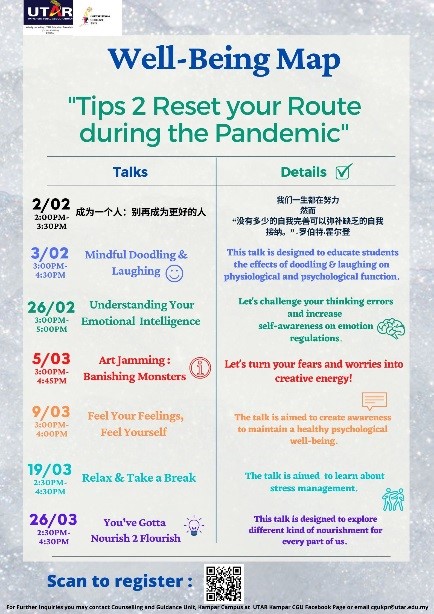
The talk series was organised by UTAR Counselling and Guidance Unit
The different stages of lockdown, due to the coronavirus, have plunged Malaysia into a period of confusion and stress. The coronavirus pandemic has placed a strain on every aspect of people’s daily life. Students and staff were forced to stay at home to adapt to the new norm.
In times of this crisis, the counsellors of UTAR Counselling and Guidance Unit (CGU), parked under the Department of Student Affairs (DSA) of Kampar Campus, organised a series of online talks under the title “Well-Being Map: Tips 2 Reset your Route during the Pandemic” from 2 February to 26 March 2021 via Microsoft Teams and Zoom.
DSA Kampar Manager Ng Foo Yek explained, “CGU organised these talk series to maintain the participants’ well-being. The talks aimed to promote mental health as well as the overall well-being of all UTAR staff, students, alumni and the public. I believe these talk series will educate participants with an array of coping skills and awareness that will ensure they are better equipped physically and mentally.”
He added, “The talk series also aimed to create awareness about mental health, build an open and supportive culture to cope with a difficult situation, build resilience to become hopeful and healthy, assist participants in accessing resourceful parts of themselves to move towards positive change as well as to help the participants develop life-long skills to cope with difficult situations.”
Hosted by registered CGU counsellors from DSA, the talks presented til 5 March 2021 were “成为一个人: 别再成为更好的人”, “Feel Your Feelings, Feel Yourself” and “Relax and Take a Break” by Ng Jo Anne; “Mindful Doodling and Laughing” and “You’ve Gotta Nourish 2 Flourish” by Gursheena Kaur; “Understanding Your Emotional Intelligence” by Ng Kai Yean and “Art Jamming: Banishing Monsters” by Ong Sweet Ling.
While conducting the Mandarin talk titled “成为一个人: 别再成为更好的人”, Jo Anne said, “We should learn how to accept ourselves if we want to have some self-improvement. Sometimes, we just need to change our mindset, we do not need to solve the problem, we just need to feel better.”
Jo Anne then added, “Everyone is unique in this world. It is important to ask yourself questions like ‘How much do you value yourself?’, ‘Do you love yourself?’ and ‘How do you define what we say – a perfect person?’. The three components of ‘self-concept’ are self-image, self-esteem and ideal self.”
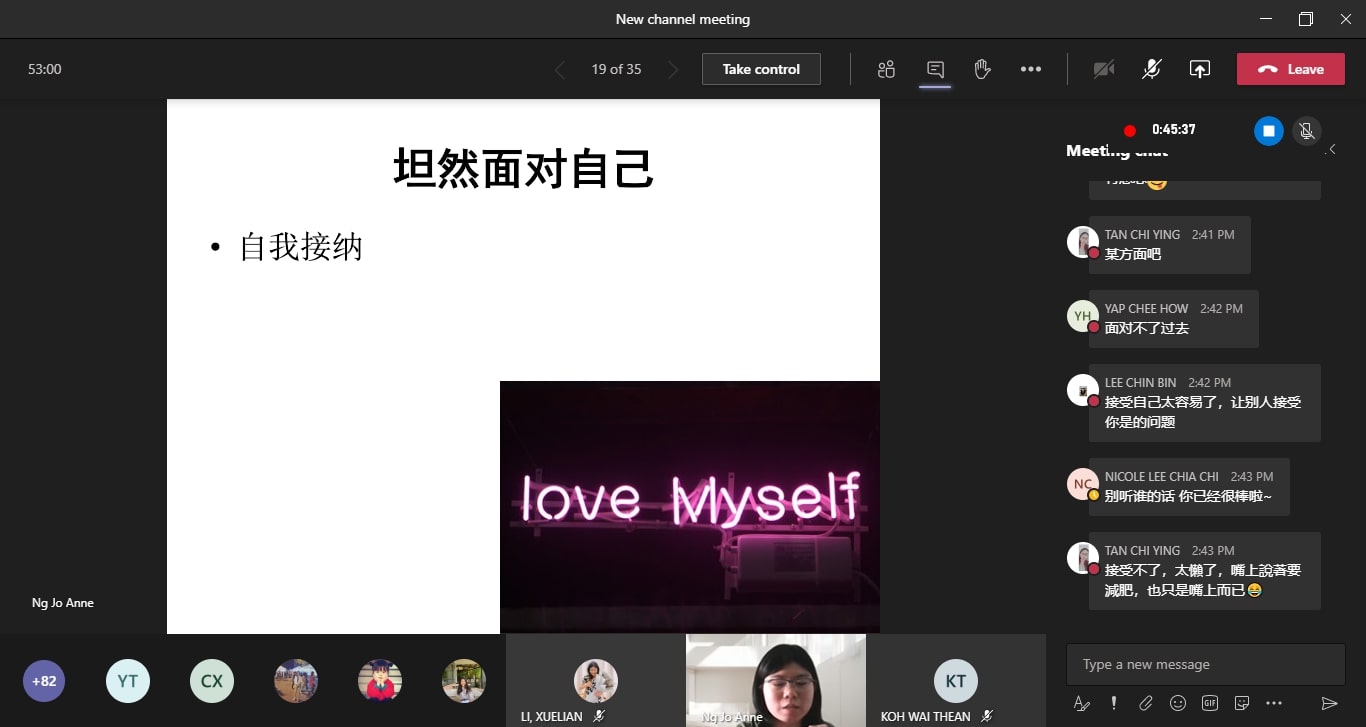
Jo Anne (bottom, second from right) highlighting the importance of self-acceptance
During the second talk titled “Mindful Doodling and Laughing”, Gursheena offered the participants a hands-on experience using doodling and laughter as a tool to bring about self-awareness. “This talk is designed to boost adult creativity and assist with reducing stress and anxiety. It creates awareness about the benefits of doodling and laughter for well-being,” said Gursheena.
Regarding the process of doodling, she explained, “Firstly, doodle with the flow of your breathing as it helps one to feel relaxed and calm. Then you can draw and direct the doodling using your five senses. Play relaxing music during the session. During the second step, notice the things around you (smell, touch, hear, see, taste) and try to focus on either one of these senses. Then, notice how it makes you feel and then you start doodling what you notice. If nothing inspires you, you can use the music to inspire you. The last step is to think about three things that would make you happy on that day.”
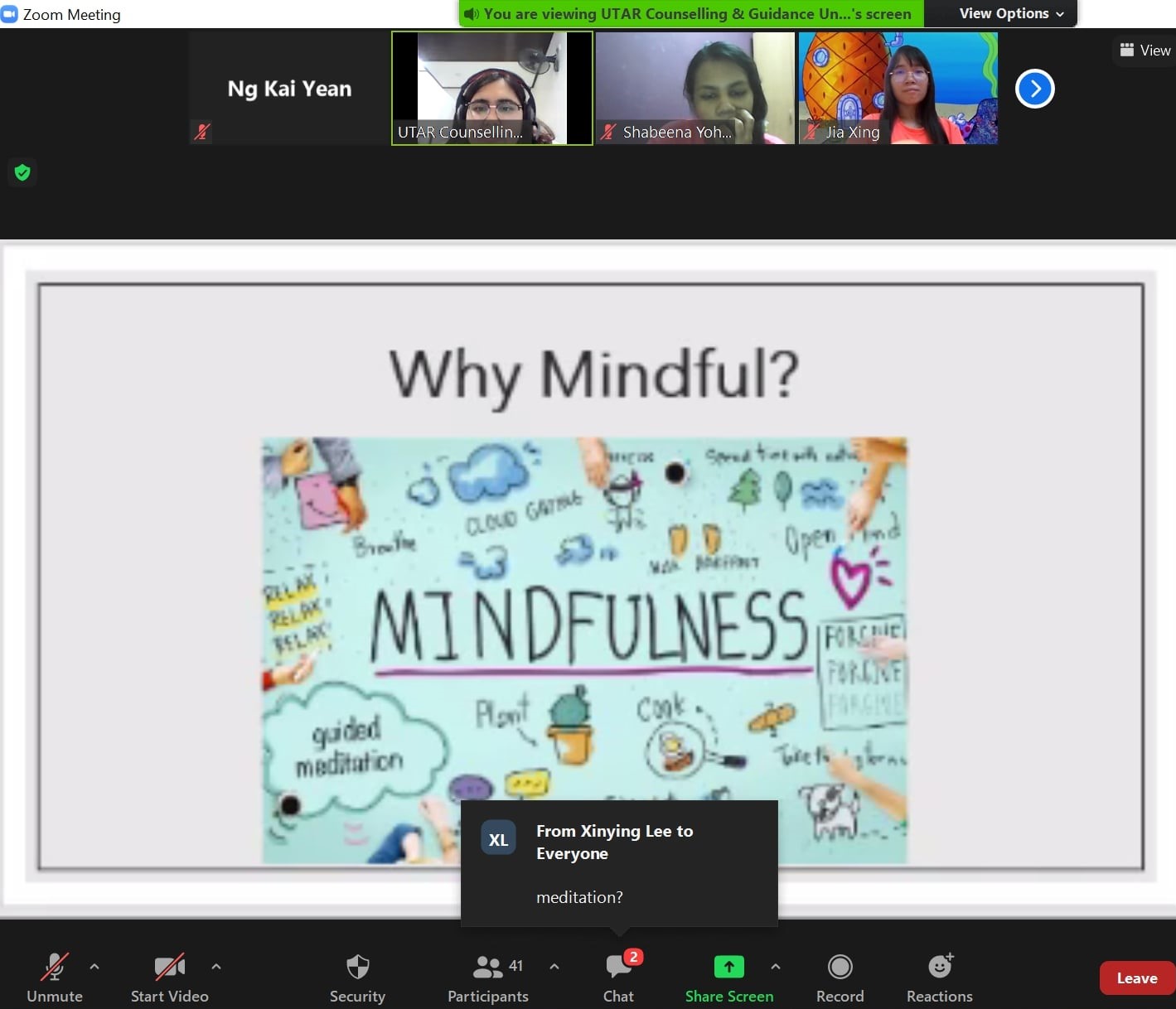
Gursheena explaining why mindfulness is important to the participants
Kai Yean kick-started her talk titled “Understanding Your Emotional Intelligence” with some games that tested the participants’ Emotional Intelligence. She showed some pictures to the participants and asked them to find out the difference. Besides, she also provided a link to the participants to test their Emotional Intelligence. The talk covered topics like “Emotional Intelligent Game: Why & What?”, “Myth and Truth about emotions”, “4-steps Emotional Regulations”, “Identity Unhelpful Thoughts” and “Tips for Happiness”.
Kai Yean explained four steps to deal with emotions as well as the mindful “S.T.O.P.” for emo-therapy. She said, “The four steps to deal with emotions are ‘Aware and Alllow’, ‘Accept and Acknowledge’, ‘Accompany’ and ‘Express’. After knowing our emotions, we can proceed with mindful ‘S.T.O.P.’ The ‘S’ stands for ‘STOP’. Try to stop any busyness temporarily and invite your attention to rest on the present moment. For the ‘T’, we take three slow, deep and mindful breaths. ‘O’ is to observe and label three sounds around us or pay curious attention to what we hear, touch or see. The ‘P’ is the last step which we proceed with whatever we need to do mindfully and do it with a smile.”
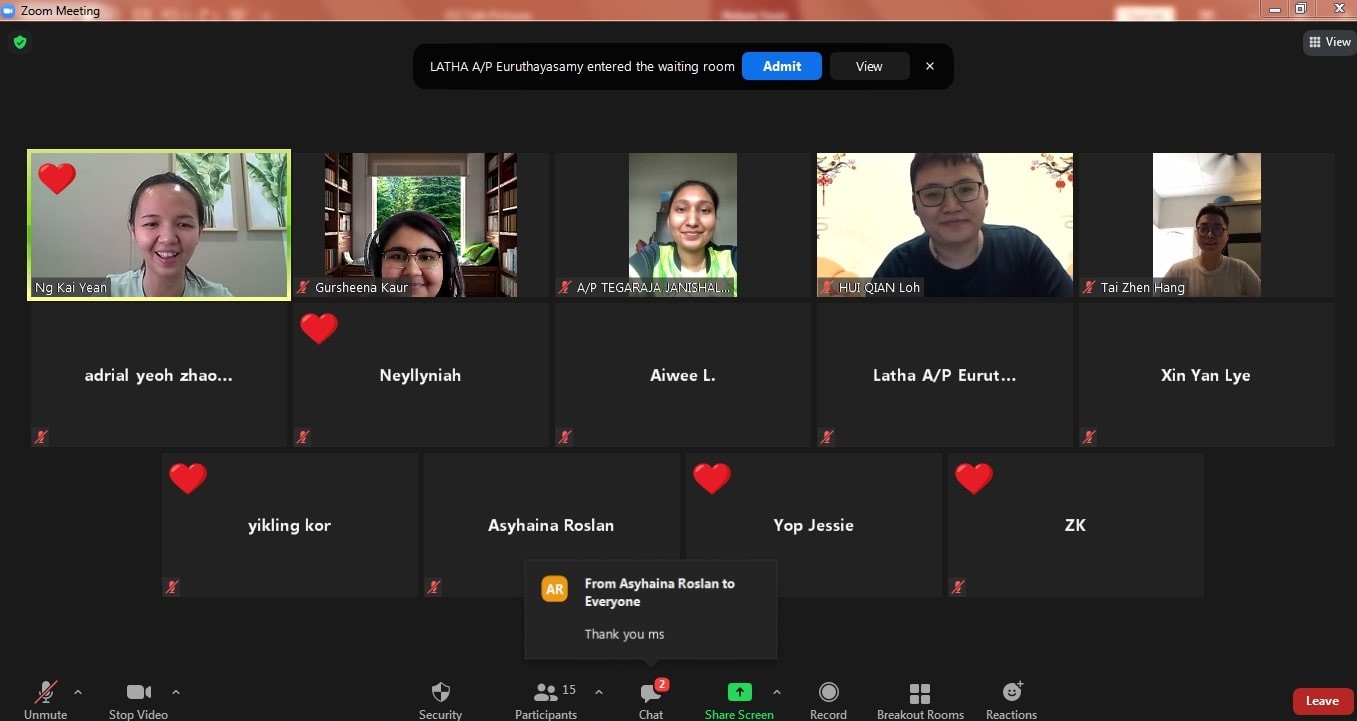
Kai Yean (top row, most left) taking group photo with the participants
On the other hand, Ong introduced another method called “Art Jamming” that taught participants how to use art as a form of expression to help relieve stress. She said, “Art Jamming is not a therapy. It is suitable for everyone; for all ages. People can do Art Jamming as individuals or as a team, but usually, people will group together to do art-making. When you do Art Jamming, you can enjoy a fun and exciting session to escape all the stress-filled days and put those worries to rest.”
According to Ong, the Art Jamming workshop titled “Art Jamming: Banishing Monsters” aimed to help students manage their worries and fears by changing them into creative energy. The activity provided a hands-on session to make sure students learned it step-by-step.
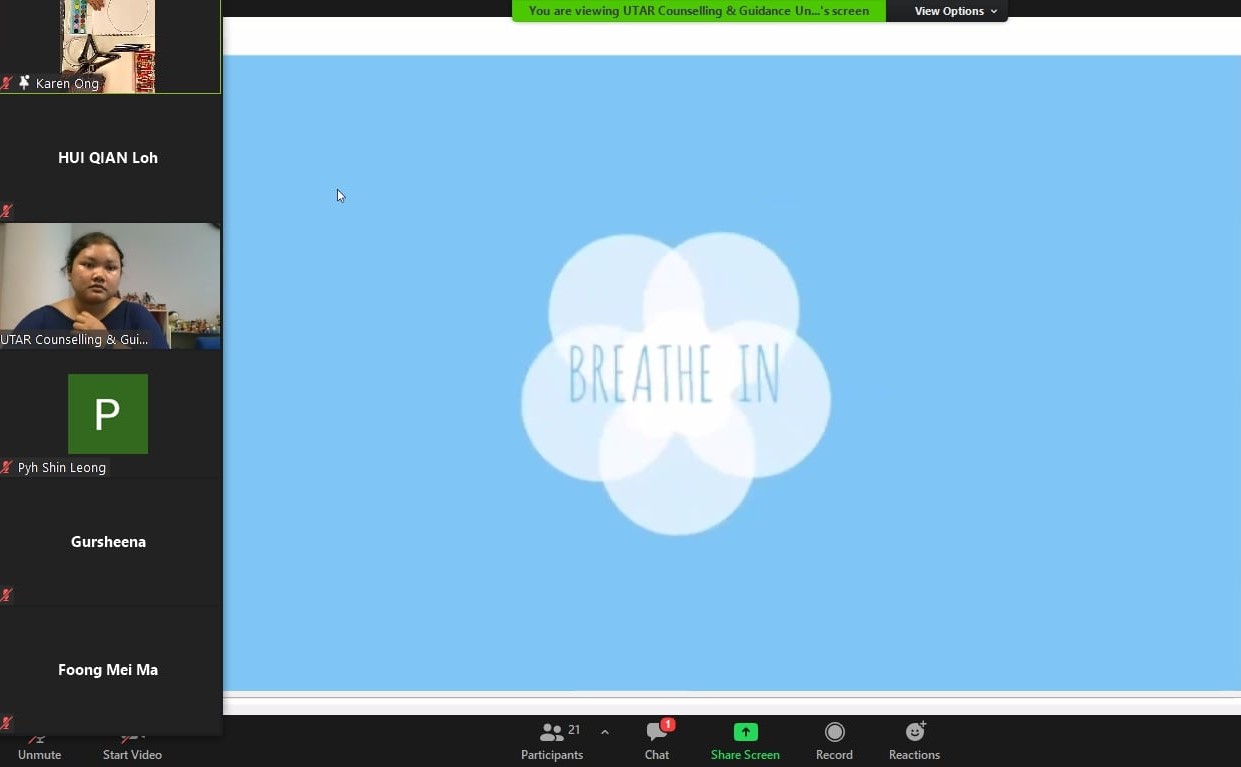
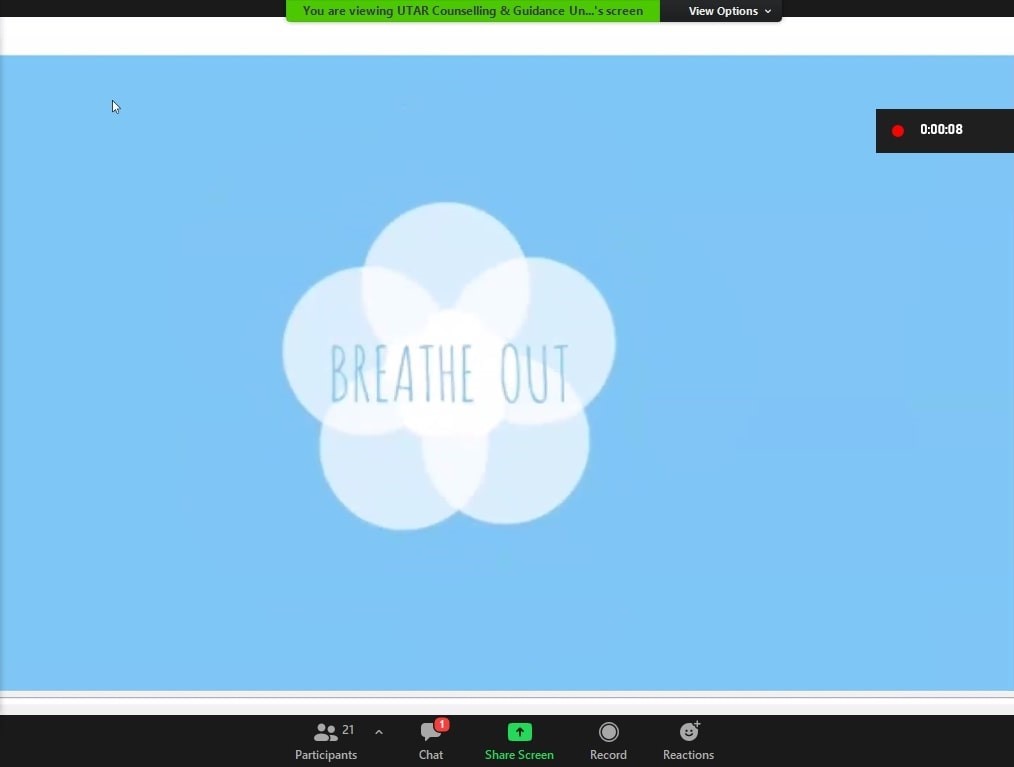
Ong teaching the participants a way to calm themselves before doing the Art Jamming
© 2021 UNIVERSITI TUNKU ABDUL RAHMAN DU012(A).
Wholly owned by UTAR Education Foundation Co. No. 578227-M LEGAL STATEMENT TERM OF USAGE PRIVACY NOTICE